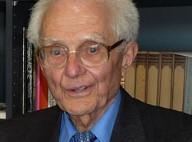Gustav's Edinburgh Memories
A new exhibition charting the history of Edinburgh's Jewish community has opened in New College, featuring the Nobel Prize-winning physicist and Edinburgh professor, Max Born. Here, his son Gustav (MBChB 1943) recalls his father's role as well as his own fascinating life.

"My family came to Britain in 1933 as refugees from Nazi Germany. In 1936, my father, Max, was appointed to the Tait Chair of Natural Philosophy at the University of Edinburgh, so my parents and I moved to 84 Grange Loan, which became our family home until my father retired in 1953. We all came to love the old grey-stone house, despite lacking central heating for the first few years, and were all very happy in Edinburgh. We took to the Scots, and the Scots took to us.
The University made my father very welcome. He made friends with some of the most distinguished of his colleagues: the then Principal Sir Edward Appleton; the mathematician Sir Edmund Whittaker; the philosopher Norman Kemp Smith; and the great musicologist Sir Donald Tovey."
School and University
"My school was the Edinburgh Academy, a demanding but touchingly friendly environment for a refugee boy. My main interest was modern, particularly British, history. I wanted to become well-informed about my new country.
I was also interested in biology. When war threatened, my father said to me, "Why don't you do Medicine, like your grandfather? Then you won't have to kill people in the war, and you are less likely to be killed yourself" - wise advice which I followed. I became a medical student at Edinburgh in 1938 and qualified in 1943, six months early because the war was at its fiercest and the army needed doctors."
Hiroshima
"After a demanding surgical residency at the Western General, I was called up and spent almost four years in the RAMC on active service, most of it in the Far East. When the atomic bombings in August 1945 caused Japan to capitulate, I went there with the British Occupation Force and was one of the first foreign medicals to enter the flattened city of Hiroshima. The horrific impression has, of course, never left me. But there was another important consequence: we doctors saw innumerable survivors of the bomb who were dying from uncontrollable bleeding because of a lack of platelets in their blood due to radiation. The memory of this is one of the reasons I later took up research on platelets."
Career and continuing Edinburgh connections
"After the army, I began research at Oxford, working specifically on blood circulation. I then became Professor of Pharmacology successively at the Royal Collge of Surgeons in London (1960-73), Cambridge (1973-78) and at King's College London (1978-86). Even after retiring from King's I continued with my research at the William Harvey Research Institute at the University of London.
Throughout the whole time I maintained connections with the University of Edinburgh, culminating with an Honorary MD conferred on me in July 1982. That summer was extraordinarily hot for Edinburgh. I remember taking my wife along for a walk over Arthur's Seat, which I used to do with my father, Max in heavy coats and long scarves. That July, however, it was in a shirt and sandals!
More recently, Professor Asif Ahmed, who began his career in my laboratory, was appointed a Professorship in Vascular Biology - a Chair which he suggested should be given my name. For this foremost recognition, I will remain deeply grateful to Asif and my old University of Edinburgh."
The free exhibition, Edinburgh Jews, is on show until December in New College on Mound Place, Monday-Friday, 9am-5pm.
Your story
Do you have a story you would like to share with your fellow alumni? If so, send us an email with the details:

